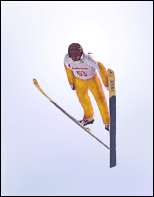Sport for All

Wild cards are added to a strict qualification system to encourage greater sports participation worldwide
by Catherine McNiff
 Eddie "the Eagle" Edwards Related Links |
Fly Like an Eagle, Swim like an. . .Eel?
Many remember the sight of Eddie “the Eagle” Edwards launching himself from the ski jump and plummeting through the air in Calgary’s 1998 Winter Olympics. The plasterer from Great Britain who had switched to ski jumping after a failed attempt to qualify in downhill finished last in both of his events, but secured a spot in many of the spectators’ hearts. Others, however, resented the attention Eddie received and felt it detracted from the more accomplished and better prepared competitors. As a result, the International Olympic Committee (IOC) established the Eddie the Eagle Rule, which requires athletes vying for inclusion in the Olympics to place in the top 30% or among the top 50-whichever is fewer-in an international competition.
Only the Best of the Best?
But while the Olympics certainly does, and should, celebrate spectacular achievement, surely there is a place for those who want to try? Under the IOC’s current policy of “continental representation,” wild card slots are available (determined by a “continental representation formula”) on a sport-by-sport basis in an ongoing move toward universal sports participation, specifically encouraging developing nations to cultivate sport. Each participating country's Olympic committee can then add its own unique qualification requirements to produce its team.
A Swimmer Who Couldn't Swim
Enter Eric “the Eel” Moussambani. Eight months before the 2000 Sydney games, he didn’t know how to swim, yet he left Equatorial Guinea with a wild card slot to compete among the world’s best. After learning to swim and training in a 20m hotel pool, Eric was told he’d be competing in the 50m freestyle. When he arrived in Sydney he discovered his name among the competitors in the 100m freestyle—a distance he’d never attempted to race. His heat of three turned into a heat of one after the swimmers from Niger and Tajikstan were disqualified for false starting. A crowd of 17,000 watched as Eric swam, then flailed, his way to the finish, the announcer incredulous, “This guy doesn’t look as though he’s going to make it.” But he did make it, buoyed by the cheering crowd.
Fighting Well
Affectionately nicknamed “the Eel” for his performance, Eric personified the Olympic motto: citius-altius-fortius; no one can argue that he did not go "faster, higher, stronger” than he ever had before. Most of us are not Olympic material. The Eddies and the Erics might be just as much an inspiration to international youth as the Usains and the Michaels. The qualification and wild card systems are not perfect, but how else can we ever hope to play on a more level field if we only encourage the best to get better? The founder of the modern Olympic Games, Pierre de Coubertin, had this to say about his beloved Games, “The most important thing in the Olympic Games is not winning but taking part; the essential thing in life is not conquering but fighting well.” Who knows, perhaps these London Games will give us, along with our medaled Olympians, another “have-a-go hero”—an everyday someone who does something truly spectacular and fights well.
Coach Eel
We might see Eric again in London. He has been named by the National Swimming Federation (FINA) and the Equatorial Guinean Olympic Committee (COGE) head coach of the Equatorial Guinea swim team.








